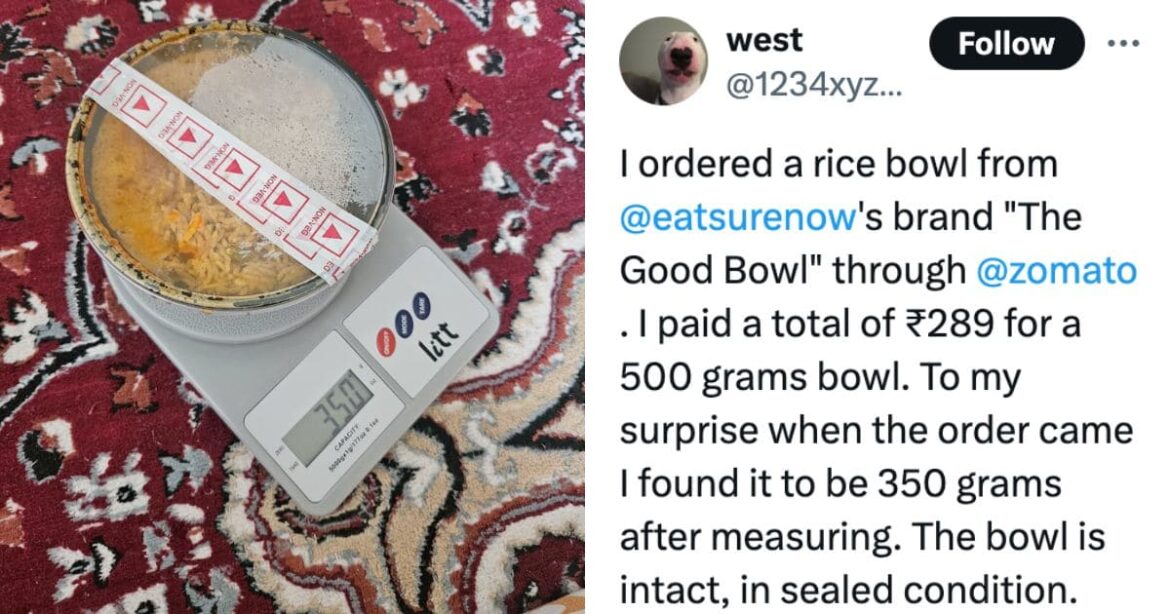A Zomato customer’s post has gone viral after he claimed that his order, which was supposed to weigh 500 grams, turned out to be only 350 grams. The incident has sparked a major discussion on social media about transparency in food delivery — and now, both Zomato and EatSure have officially responded.
Let’s break down what happened, what Zomato and EatSure said, and why this issue matters to millions of online food delivery users in India.
The Viral Complaint That Started It All
The controversy began when an X (formerly Twitter) user, @1234xyzzzzz, posted a photo of his meal from The Good Bowl, a brand under EatSure, which he had ordered through Zomato.
He claimed that although he paid ₹289 for a Chicken Kheema Rice Bowl advertised as weighing 500 grams, the sealed bowl actually weighed just 350 grams when he put it on a digital scale.
The post included a photo showing the sealed bowl placed on the weighing scale, clearly displaying the reduced weight. His caption read:
“I ordered a rice bowl from @eatsurenow’s brand ‘The Good Bowl’ through @zomato. I paid a total of ₹289 for a 500-gram bowl. To my surprise, when the order came, I found it to be 350 grams after measuring. The bowl is intact, in sealed condition.”
The tweet quickly gained traction, drawing thousands of reactions and comments from other users who shared similar experiences.
Zomato and EatSure Respond Publicly
Both Zomato and EatSure noticed the viral post and were quick to respond. Their replies were polite, professional, and focused on resolving the issue.
EatSure replied first, writing:
“Hi there! That is certainly not the experience we intend for our customers, and we apologise as your experience has been hampered. Kindly DM us your contact number so that we can fix this for you.”
Shortly after, Zomato also responded to the post, saying:
“Hey there, this is certainly not the kind of experience we want you to have with us. Please allow us some time to look into this and get back to you with an update.”
Both brands assured the user that they would look into the matter. However, the incident reignited a bigger conversation about portion size transparency in India’s booming online food delivery market.
Why Portion Size Complaints Are Rising
In India, customers rely heavily on food delivery platforms like Zomato and Swiggy to order from restaurants and cloud kitchens. Descriptions like “500g rice bowl” or “250ml smoothie” help customers gauge value for money — especially as food prices and delivery fees keep rising.
However, there’s no clear or standardized mechanism to verify the actual quantity once the food is packed. Customers can only take the restaurant’s word for it — until they open the box or weigh it themselves.
In recent months, social media platforms like X (Twitter) and Reddit have seen multiple complaints about smaller portions or lighter meals than advertised. Some users even speculate that certain restaurants include packaging weight in the total quantity shown online, which misleads customers.
Consumer Reactions: Trust Is the Real Issue
Many users expressed frustration in the comments under the viral post, saying that such incidents damage trust between customers and food delivery platforms.
“It’s not about 150 grams — it’s about honesty. If I pay for 500 grams, I should get 500 grams,” one user wrote.
Another added:
“Food delivery has become a daily habit for many people. If brands start misleading customers with incorrect portions, it affects the entire industry’s credibility.”
Transparency and consistency are the key pillars of online delivery businesses. When those are questioned, it becomes more than just a customer service issue — it’s a trust problem.
Zomato’s Efforts Toward Transparency
To be fair, Zomato has taken several steps in recent years to make its platform more transparent and customer-friendly.
The company introduced features like:
- Calorie count display for each meal.
- Hygiene ratings for partner restaurants.
- Estimated preparation and delivery times for better accuracy.
However, quantity and weight verification are areas where even leading food-tech companies face challenges. Since food is prepared and packaged by partner restaurants, Zomato has limited control over the final output.
The Bigger Picture: A Need For Standardization
Incidents like this one highlight the need for clear labeling and packaging rules in India’s online food delivery ecosystem.
Currently, there’s no standard regulation that defines whether food weight should include:
- The weight of the packaging, or
- Only the net edible content.
This lack of clarity leaves room for confusion — and sometimes, exploitation. Industry experts believe that implementing a standard verification system, such as random audits or customer feedback-based penalties, could help ensure more transparency.
What Could Change After This Incident
Public social media posts often force companies to take corrective action faster than private complaints. If more customers come forward with similar issues, platforms like Zomato and Swiggy might be pushed to introduce new policies or restaurant compliance checks.
We may soon see features such as:
- Verified “net weight” tags on menu items.
- Customer feedback metrics visible on restaurant profiles.
- Automatic refunds or discounts for quantity mismatch complaints.
Such measures could restore customer confidence and set a new benchmark for fairness in the food delivery space.
Final Thoughts
While Zomato and EatSure’s quick responses show accountability, the viral post raises a valid concern that resonates with millions of users: Are we really getting what we pay for?
As food delivery becomes an everyday part of urban life, customers expect more honesty and precision in what’s being delivered. Even small lapses — like a 150g difference — can trigger big debates when trust is at stake.
Zomato’s response might help resolve one customer’s issue, but it also serves as a wake-up call for the entire industry to build more transparent, verified, and customer-centric systems in India’s fast-growing online food economy.

